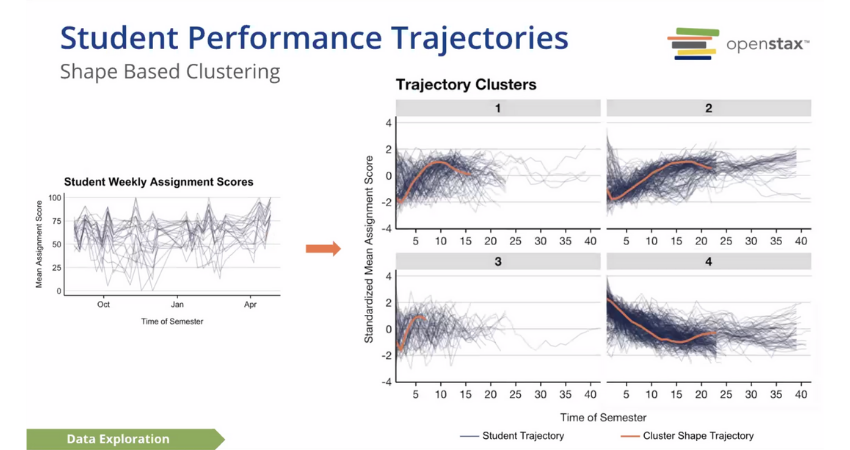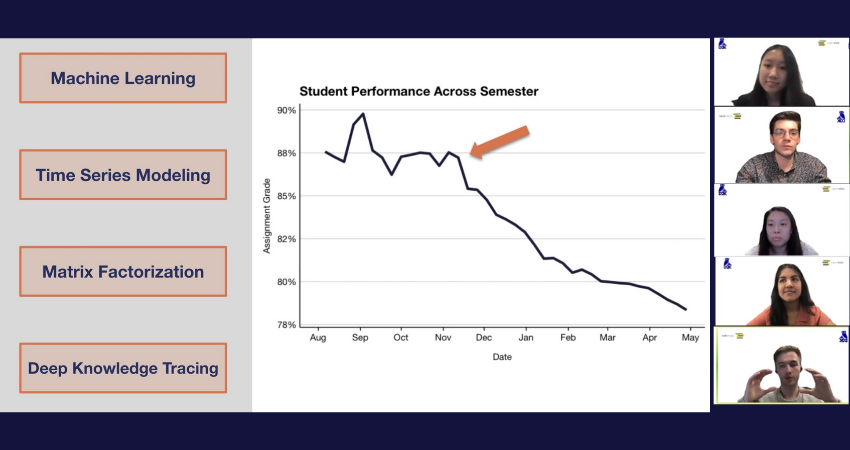(Photo Caption: Team OpenStax presented their work at the D2K Showcase. From top: Stephanie Xie, Connor Rothschild, Jessica Wang, Diksha Gupta and Parker Graham)
Rice D2K Lab students working with capstone project sponsor OpenStax developed a data-driven approach to identifying students falling behind in classes. The goal of the project was to provide teachers with actionable predictions and to strengthen student-teacher connections. In our current remote learning environment, these predictors were especially important, as students were having fewer interactions with teachers.
This D2K Capstone project was sponsored by OpenStax, a nonprofit organization at Rice University that provides open educational resources for students and teachers. “We are extremely proud of Team OpenStax and the work they put forth,” said Debshila Basu Mallick, research scientist at OpenStax and the sponsor mentor of the project. “From the get-go, Team OpenStax understood the significance of what they were working on: a small step toward reducing inequities in education, especially as teachers and students struggle to stay afloat during this pandemic.”
“Forty-two percent of students in the Houston Independent School District are failing. When students fail a class, it can impact them both short-term academically and long-term if they don't graduate,” said team member Stephanie Xie, a senior in computer science and cognitive sciences. “Lower graduation rate is a big issue for schools.”
The capstone student team analyzed data provided by the online learning platform called Tutor which included nearly 800 high-school students’ online engagement, responses and assignment grades spanning two semesters. The team chose to use a technique called shape-based clustering to create student performance trajectories.

To forecast and diagnose student performance, Team OpenStax built a model that tracks students’ knowledge of the courses. Parker Graham, a senior in statistics and computer science, explained, “We performed feature engineering using natural language processing to gauge students’ level of interaction with the course material. It also allowed us to identify the individual types of knowledge that a student had, so we could pinpoint exactly where they were falling behind in the class.”
Team members were enthusiastic and proud of the potential impact. “We were working with high-school students, but the technology could be applicable to college, grad school and the education industry in general,” said Diksha Gupta, a senior in computer science.
Team OpenStax’s project won the Honorable Mention in the D2K Showcase, one point short of the winning team. “We were definitely sad that we were that close, but happy we were awarded the Honorable Mention. Moreover, it was a pleasure to place in the competition and see how impressive every team’s projects were,” said Connor Rothschild, a senior studying social policy analysis.
In the D2K Lab, students put their computational and data engineering skills into real-world application using cutting edge data science tools and research. Gupta said, “We all brought something to the table and were able to communicate our expectations and progress even though we were all remote.”
Jessica Wang, a professional master’s student in statistics, took the course last year and was able to impress recruiters with her capstone experience. “Interviewers were interested in hearing about this class, the process of developing a data-science pipeline, and how we applied new data science techniques to real-world issues.”
This D2K capstone program challenges students from many different disciplines and stages in their academic career to work on a project team to solve a client’s real-world data science problem.
“I think having quantitative skills is helpful in any domain and increasingly so in social science, my discipline,” Rothschild said. “Being able to work with teams and engage in analytical projects rounded out my skillset in a way that a lot of other courses couldn't have.”
Watch Team OpenStax’s video to learn more about their work:
Interested in sponsoring a D2K Capstone project?
Visit the website to learn more: https://d2k.rice.edu/program/data-science-capstone

